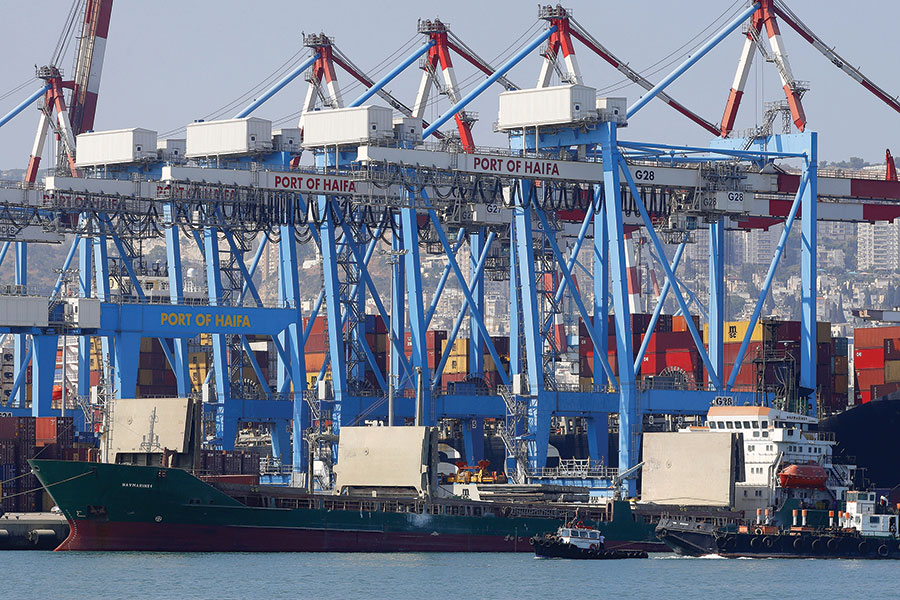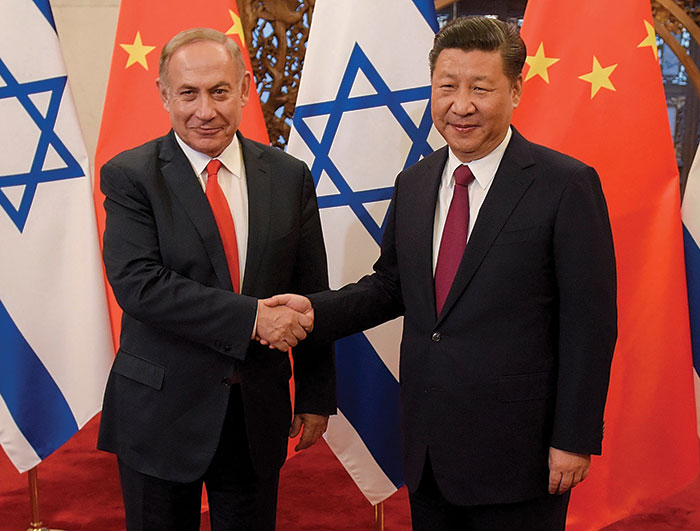Belt, Road, and Risk
Last year, the National Defense Authorization Act included an aside about the Sixth Fleet’s port of call in Israel:
The United States has an interest in the future forward presence of United States naval vessels at the Port of Haifa in Israel but has serious security concerns with respect to the leasing arrangements of the Port of Haifa as of the date of the enactment of this Act; and should urge the Government of Israel to consider the security implications of foreign investment in Israel.
The Shanghai International Port Group has a 25-year lease, beginning next year, to operate a new port in Haifa. This is part of China’s “Belt and Road Initiative,” its investment in land and sea routes which it hopes will establish the infrastructure of a global trading network with China at its hub. What concerned the Senate was that General Secretary Xi Jinping’s economic initiatives and goals merge with those of his intelligence services and military. The Haifa port, as it happens, is next to Israel’s main naval base.
Tensions around the Haifa port reflect broader US concerns over China’s investment in Israel. While in that country in March 2019, US Secretary of State Mike Pompeo warned that “if certain systems go in certain places then America’s efforts to work alongside you will be more difficult.” He also advised:
Intelligence sharing might have to be reduced, co-location of security facilities might have to be reduced, we want to make sure countries understand this and know the risks.
When Prime Minister Netanyahu visited the White House shortly thereafter, President Trump was said to have put the same point more bluntly: Washington’s security will be compromised if Jerusalem and Beijing grow too close.
The good news for American-Israeli relations is that the two countries are starting to manage their differences over China, including developing security protocols at the port. But this issue isn’t just about a port, and, given China’s ambition to lead a new world order, it won’t go away. Since 2005, China has invested almost $10 billion in Israel and is likely to invest more. It also has more than one thousand students attending Israeli universities, most of whom are studying science, technology, and engineering. Of course, one thousand students and $10 billion are mere drops in the bucket for China, but they are significant for a small country like Israel. Indeed, it is easy to understand why isolated and beleaguered Israelis welcomed this attention from a great power with no antisemitic historical baggage.
How wary should Israel be of China’s tightening embrace? And how worried should America be, given how much it shares with Israel in terms of military technology and intelligence?
While Sino-American tension had been building for a decade, the rivalry intensified after Xi Jinping alarmed Washington in 2017. China’s “paramount leader” announced that China seeks to “become a global leader in terms of composite national strength and international influence.”In the new world order that Xi envisions, China would surpass the US in military-technological power and replace US alliances with a network of China’s main strategic partners.

Israel should certainly be more concerned about China than it has been since it has been a prime beneficiary of the existing system that China seeks to overthrow. If China succeeds, the global order will be more closed, authoritarian, and divided into exclusive spheres of influence. But there is little Israel can do to affect a major-power competition over the future of the international system—that’s Washington’s job. What Israel can do is pay much more attention to Chinese attempts to leverage commercial, educational, and cultural ties to expand its political influence and further its espionage.
Israel, of course, has some of the best intelligence services in the world, but they are used to combatting imminent, existential threats, not soft subversion. The US and its allies are slowly uncovering the intricate webs of the Chinese Communist Party’s networks of political influence and destabilization. Here, Australia provides a cautionary example. In June, the home of Shaoquett Moselmane, a legislator from New South Wales, was raided by the Australian Security Intelligence Organization. He has since been suspended from the New Labor Party, pending an investigation into whether he was a paid agent of the Chinese government. If so, he would not be the first Australian legislator to have been suborned by the Chinese. Senator Sam Dastyari resigned from Parliament in December 2017 after it was revealed that he had taken money from a donor who was close to the Chinese Communist Party. Both legislators consistently took the Chinese line on Hong Kong, the South China Sea, and other issues of interest to China.
In Australia, as elsewhere, China has also employed students as spies. According to the authoritative work of Australian journalist Clive Hamilton:
Australian institutions—from our schools, universities and professional associations to our media; from industries like mining, agriculture and tourism to strategic assets like ports and electricity grids; from our local councils and state governments to our political parties in Canberra—are being penetrated and shaped by a complex system of influence and control overseen by agencies serving the Chinese Communist Party.
The US is uncovering similar networks of Chinese influence. A few examples from the recent past: A Chinese scholar at the University of California, Los Angeles, was convicted in June of shipping banned missile technology to his homeland, and a student at Chicago’s Illinois Institute of Technology was charged last year with helping to recruit spies. More infamously, Charles Lieber, the chairman of Harvard’s Department of Chemistry and Chemical Biology, was arrested in January for his alleged paid secret involvement in Beijing’s “Thousand Talents Plan.” Its goal, in the words of the US National Intelligence Council, is the “legal and illicit transfer of US technology, intellectual property and know-how.”
Of course, China is much more interested in Australia, a major country in the Asia-Pacific region, not to speak of America, its global rival, than in Israel. Still, given Israel’s technological sophistication and its close strategic alliance with America, Israel now must prepare itself for a complicated subversive threat.
Nonetheless, in contrast to the challenge of espionage and political subversion, China’s military and geopolitical threats to Israel should not be overstated. The Middle East is not on the frontlines of the Sino-American geopolitical competition; compared to Asia and even Europe, the Middle East remains mostly a gas station for Beijing. In 2018, the value of China’s economic activity in Europe was almost double that of its investment in the Middle East ($48 billion vs. $26.6 billion).
What about China’s relationship with Israel’s arch-enemy Iran? While China is reportedly considering a $400 billion, 25-year investment deal with Iran, the plan warrants skepticism. Chinese state-owned enterprises cannot afford to be sanctioned by the United States for entering the Iranian market. Moreover, the ultimate Chinese interest in the Middle East is to keep the oil freely flowing from the Gulf; Beijing is extremely unlikely to risk its good relations with Saudi Arabia by becoming too close to Iran. In short, Chinese oil interests should not be a serious Israeli concern. Jerusalem will have to accustom itself to a Chinese regional military presence, such as its base in Djibouti, but none of this poses much of a threat to Israel or the American-Israeli alliance.
In 2016, China announced that it would strengthen “multi-level cooperation along [the Belt and Road Initiative] by encouraging academic exchanges, joint national labs, international talent development, and long-term technology transfer and innovation networks” with Israel. There are well-funded scholarships for Chinese students to study in Israel, and Chinese and Israeli universities have set up collaborations in cutting-edge areas like artificial intelligence research, precisely the technology that the United States worries China will use for military purposes.

However, technology cooperation is not yet driving Sino-Israeli commercial relations. Chinese investments make up anywhere from 10 to 20 percent of total foreign direct investment in Israel, but so far, the most substantial investments have not been in the technology sector. Rather, Bright Foods bought control of Tnuva, Israel’s largest food company; ChemChina purchased the remaining 40 percent stake in a crop protection company called Adama, giving it total control; and Alpha Frontier made the single largest Chinese investment in an Israeli company: $4.4 billion in Playtika, a company that makes video casino games.
Still, there are reasons for concern. First, China often uses nontechnological commercial activity as a Trojan horse to gain leverage in a target country. As small countries depend on Chinese investment, over time, Beijing demands more technology. Second, between 2013 and 2018, major Chinese technology companies have made investments in Israeli technology that do, in fact, have potential national and internal security applications. A notable example is the controversial telecom company Huawei’s 2016 acquisition of Israel’s HexaTier, a data cloud computing company. That same month Huawei also acquired IT research firm Toga Networks. Although Huawei will never get a backdoor into the Israeli telecommunications system as it has elsewhere—the Shin Bet keeps it under close watch—the United States looks askance at any relationship with Huawei, which it rightly regards as a tool of Chinese intelligence agencies.
Israelis should also familiarize themselves with the independent US Intellectual Property Commission, which estimated in 2017 that IP theft cost the US economy more than $255 billion annually. The IP Commission concluded that China alone was responsible for 50 to 80 percent of all counterfeited goods, pirated software, and theft of trade secrets. As a small “start-up nation,” whose success is built on innovation, Israel is, if anything, more vulnerable than the United States.
America and Israel are now working more closely on Chinese investments in the Jewish state, and Israel is trying to establish a regulatory structure that can review foreign investments and exports for their national security impact. But Israel clearly still has work to do on both fronts. Moreover, as Pompeo’s comments this spring underscore, the US views any sign that an ally is getting too close to China as deeply problematic. Israeli policymakers should think long and hard about the danger of allowing its nascent relationship with China to drive a wedge between Washington and Jerusalem. Given the range and magnitude of threats China can pose to the Jewish state, Israeli leaders should ask if Chinese money and scientific collaboration are really worth it.
Suggested Reading

A Life with Consequences
Yitzhak Rabin was a realist who saw peacemaking not as the source of security but as a further development that needed to be based upon security.

Middle Position
An insider account reveals how personal relationships and rivalries often shape Washington's foreign policy.

East Meets West
Following the Six-Day War, the East German government and the West German far left demonized Israel time and again, often vilely equating it with the worst thing in their own nation’s history: Nazism.
The Family Heretic
Mark Mazower’s What You Did Not Tell: A Russian Past and the Journey Home belongs to a newish genre: the Jewish family memoir that is an act of filiopiety but also illuminates broad historical themes.
Comments
You must log in to comment Log In